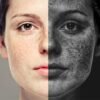Pollution and Premature Hair Graying: Myths and Facts
Pollution is a ubiquitous presence in our modern world, impacting not only the environment but also potentially affecting our health in various ways. One of the lesser-known yet increasingly studied effects of pollution is its potential link to premature hair graying. This article explores the myths and facts surrounding pollution and premature hair graying, shedding light on how environmental factors may influence the color and health of our hair.

Understanding Premature Hair Graying
Hair graying is a natural part of the aging process, typically starting in middle age and progressing over time. It occurs when melanocytes, the cells responsible for producing pigment (melanin) in hair follicles, gradually decrease in function. Genetics play a significant role in determining when and how quickly this process occurs, with some individuals experiencing premature graying—defined as graying before the age of 30.
Myth: Pollution Directly Causes Hair to Turn Gray
One prevalent myth is that pollution directly causes hair to turn gray. However, the scientific consensus suggests otherwise. Hair graying is primarily influenced by genetic factors and aging, not by external environmental factors like pollution. Pollution does not directly alter the production of melanin in hair follicles, which is the primary determinant of hair color.
Fact: Pollution May Accelerate Hair Aging
While pollution may not directly cause hair to turn gray, it can contribute to conditions that accelerate the aging process of hair. Pollutants such as particulate matter (PM), heavy metals, and volatile organic compounds (VOCs) can induce oxidative stress on the scalp and hair follicles. Oxidative stress occurs when there is an imbalance between free radicals (reactive oxygen species) and antioxidants in the body. This imbalance can lead to damage to cells, including melanocytes, potentially hastening the natural aging process of hair.
Myth: Only Air Pollution Affects Hair Graying
Another misconception is that only air pollution affects hair graying. In reality, various forms of pollution, including water pollution and exposure to chemicals in hair care products, can impact hair health. Contaminated water containing heavy metals like lead and cadmium can be absorbed through the scalp, potentially affecting hair follicles and melanin production.
Fact: Environmental Factors Play a Role in Hair Health
Environmental factors, including pollution, can play a role in overall hair health and vitality. Prolonged exposure to pollutants can weaken hair follicles and contribute to conditions such as dryness, brittleness, and hair loss. While pollution may not directly cause hair graying, it can exacerbate existing conditions that affect hair quality and appearance.
Myth: Pollution’s Impact on Hair is Irreversible
Some believe that the damage caused by pollution to hair is irreversible. While severe damage may be challenging to reverse completely, taking proactive steps to protect hair from pollution can help mitigate its effects. Regular cleansing of the scalp and hair to remove pollutants, using protective hairstyles, and incorporating antioxidant-rich hair care products can support hair health and minimize damage over time.
Fact: Preventive Measures Can Make a Difference
Implementing preventive measures can significantly impact hair health in polluted environments. Using sulfate-free shampoos and conditioners, applying hair masks enriched with antioxidants, and maintaining a balanced diet rich in vitamins and minerals are essential steps in protecting hair from the effects of pollution. These practices can help strengthen hair follicles, improve melanin production, and maintain the natural color and vibrancy of hair.
Practical Tips to Protect Hair from Pollution:
- Regular Cleansing: Wash hair frequently with a gentle shampoo to remove pollutants and prevent buildup on the scalp.
- Antioxidant-Rich Products: Use hair care products containing antioxidants like vitamin E, vitamin C, and green tea extract to combat oxidative stress.
- Protective Hairstyles: Wear hats or scarves to minimize direct exposure to pollutants and reduce damage to hair follicles.
- Balanced Diet: Maintain a diet rich in antioxidants, omega-3 fatty acids, and vitamins to support overall hair health.
- Avoid Harsh Chemicals: Limit the use of hair care products containing harsh chemicals that can strip natural oils and weaken hair.
Hidden Dangers: How Air Pollution Affects Your Skin and Hair
Conclusion
While pollution may not directly cause hair graying, its impact on overall hair health should not be underestimated. By understanding the myths and facts surrounding pollution and premature hair graying, individuals can take proactive steps to protect their hair from environmental stressors. Adopting a holistic approach to hair care, including regular cleansing, using antioxidant-rich products, and maintaining a healthy lifestyle, can help maintain hair vitality and delay the signs of aging.







Leave a reply